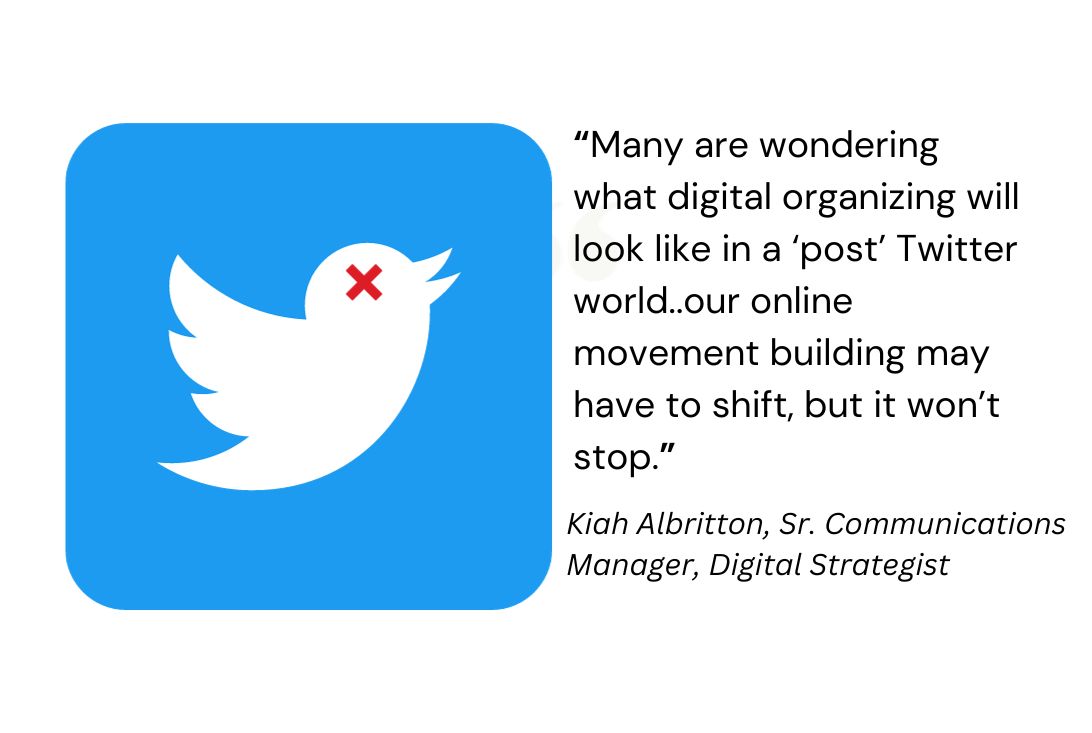Throughout the last 15 years, Twitter cemented itself as our digital town square. For me and many others, #BlackTwitter especially has served as a communal grounds for sharing jobs, creative opportunities, watching award shows, and fortifying movements. Twitter allows for rapid, accessible conversation between people from all corners of the globe, a space for marginalized folks to converse and strengthen our individual fights for our collective liberation. The platform revolutionized the way nonprofits, philanthropy, and social impact groups could communicate with their audiences and respond to real time events.
It was only a matter of time before a space like that came under attack.
Since buying Twitter in October 2022, Elon Musk has intentionally made it more difficult for organizing to occur on the app and much easier for Black and queer people to be inundated with hate speech from right-wing accounts. Recently, Musk claimed that users will soon have to pay a “small monthly fee” for access to the platform. It feels imminent that the next time we log in, Twitter (or X as it was recently rebranded to) will be completely unusable.
As a digital organizer who knows that organizing our communities online is a vital part of any strategic communications plan, it’s been difficult to watch Twitter become overrun by bots and white supremacist rhetoric. I’m sure many are wondering what digital organizing will look like in a “post” Twitter world. While Twitter has not fully been dismantled yet, we’ve scoped out some of the emerging alternatives and offer suggestions below on how to strengthen your digital community on the existing apps. Our online movement building may have to shift, but it won’t stop.
Platforms emerging as Twitter alternatives
In May 2023, the Pew Research Center found that a quarter of Twitter users “are not very or not at all likely to be on Twitter a year from now.” While some people may use their Twitter departure to be less online, there are folks seeking out alternative spaces to connect with their community.

Spill: Founded by two former Twitter employees, Spill is a Black-owned app built around creating safety for diverse communities – specifically Black and queer people. Due to the platform’s explicit mission to serve Black and queer communities, many wonder if it’s the logical next home for #BlackTwitter. The app prioritizes content featuring photos, videos, and gifs and the tone so far has been meme-forward and funny. Currently, Spill is still in beta testing, so to join users must have an invite code or sign up for the waitlist. If you’re in communications or your organization’s early tech adopter, we recommend exploring Spill but waiting to develop a full communications strategy for this app until it’s out of beta.

Threads: Meta, the parent company of Facebook and Instagram, launched Threads in early July with over 100 million users signed up in the first five days. However, Threads active user count is already down 82% from its launch. Many brands and nonprofits like CNN, ACLU, and Stop AAPI Hate joined the platform soon after it launched. If you have an Instagram account, it’s incredibly easy to create your Threads profile using that same information and connecting to the same audience. An important note – Adam Mosseri, head of Instagram, said in a conversation that Threads is trying to “create a less angry place for conversations” and as part of this goal, Threads will not try to promote politics or hard news. Because of that, Threads could be a useful tool for building brand/campaign awareness, but currently isn’t useful for organizing and responding to breaking news.

Mastodon: “A social networking site that’s not for sale.” Mastodon is a decentralized social media app that doesn’t sell ads or user data. The platform is divided into different servers which center on a variety of topics like arts, music, video games, and location. Users must select a server before joining, and anyone can create a new server after signing up. Each server is responsible for its own content moderation and management. Mastodon could be a great way to communicate with an established coalition or network, but it’s difficult to gain exposure to new audiences on the site.
There are many other platforms people are exploring as Twitter alternatives including Bluesky, Discord, Reddit, etc. Our advice is to stay focused on where your audience and peer organizations are headed first. Finding your community is the biggest determining factor on whether your organization should launch a new profile.
Using existing platforms to build community
After evaluating the new options, you may decide that the best move for your organization is not to join any of the new apps yet. This could be an ideal time to reassess your community building and engagement strategies on your existing platforms. Here are some tips for strengthening community engagement you can incorporate into your existing strategy:
Across platforms:
- Review and respond to DMs at least weekly.
- Engage with comments on your posts by liking them and responding where it makes sense.
- Review your new followers and decide if it makes sense for your organization to follow back. Be sure to connect with your coalition partners on social media and engage with them online.
- Spend 15 minutes each week scrolling through your feeds and engaging with the accounts you follow.
Instagram:
- Host dialogues and community conversations on IG Live.
- Use IG Stories features like polls, quizzes, and Q+A to interact with followers.
- Have staff members or other partners “takeover” your IG Stories.
LinkedIn:
- Reshare relevant posts from your partners and peer organizations.
- Highlight staff members, grantee partners, and community members to show the faces behind your movement.
TikTok:
- Use trending sounds and audio to expand your audience.
- Post often to benefit from TikTok’s algorithm – more is more here!
- Lean into a casual/humorous tone to match the energy of the app.
No platform will ever fully replicate the experience of Twitter in its prime, so it’s helpful to accept that this may just be the end of an era. One of the most powerful things about digital media is users’ ability to navigate ever changing and evolving platforms. We encourage you to lean into learning and exploration as your community decides where to spend their time online. Even amidst all of this change, it remains true that the best way to maintain and expand your online community on any social media app is authentic and consistent engagement.
Questions on how you can improve your social media strategy for your organization? Please reach out to us at hello@change-llc.com!

